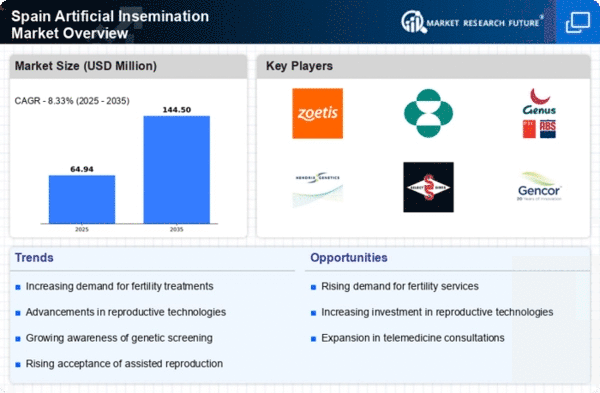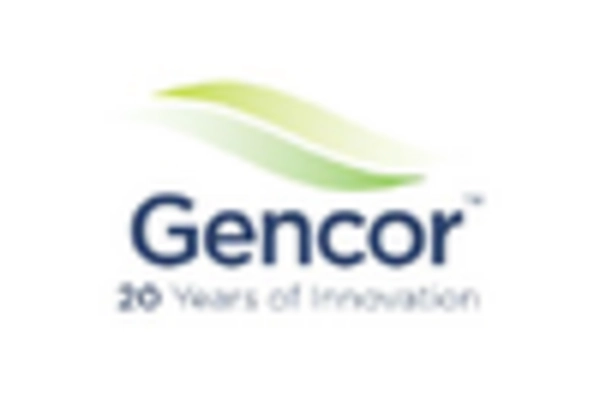Rising Infertility Rates
The increasing prevalence of infertility in Spain is a crucial driver for the The increasing prevalence of infertility in Spain is a crucial driver for the artificial insemination sector.. Recent statistics indicate that approximately 15% of couples in Spain experience difficulties in conceiving, which has led to a growing demand for assisted reproductive technologies. This trend is further exacerbated by lifestyle factors such as delayed childbearing, obesity, and environmental influences. As more individuals seek solutions to infertility, the artificial insemination market is likely to expand significantly. Clinics and healthcare providers are responding to this demand by enhancing their services and offering advanced reproductive techniques. The rising infertility rates not only highlight the need for artificial insemination but also create opportunities for innovation within the industry, potentially leading to improved success rates and patient satisfaction.
Government Initiatives and Funding
Government initiatives and funding play a pivotal role in shaping the artificial insemination market in Spain. The Spanish government has implemented various policies aimed at supporting reproductive health services, including subsidies for fertility treatments. These initiatives are designed to make artificial insemination more accessible to a broader population, particularly for couples facing financial constraints. In 2025, it is estimated that government funding for fertility treatments will increase by 15%, further encouraging couples to pursue artificial insemination. Such support not only alleviates the financial burden on patients but also promotes the growth of clinics and healthcare providers specializing in reproductive health. The proactive stance of the government in this area is likely to enhance the overall landscape of the artificial insemination market.
Increased Awareness and Acceptance
There is a notable rise in awareness and acceptance of artificial insemination in Spain, which serves as a significant driver for the market. Educational campaigns and media coverage have contributed to a better understanding of reproductive health and the options available for couples facing infertility. As societal norms evolve, more individuals are open to exploring artificial insemination as a viable solution. This shift in perception is reflected in the increasing number of consultations and procedures performed annually. In 2024, the artificial insemination market saw a growth of approximately 10% in procedure uptake, indicating a positive trend. The growing acceptance not only encourages couples to seek assistance but also fosters a supportive environment for discussions around reproductive health, further propelling the market forward.
Cultural Shifts Towards Family Planning
Cultural shifts in family planning are significantly influencing the artificial insemination market in Spain. As societal attitudes evolve, there is a growing acceptance of diverse family structures and reproductive choices. More individuals are prioritizing career and personal development before starting families, leading to delayed childbearing. This trend has resulted in an increased reliance on artificial insemination as a means to achieve parenthood later in life. In 2025, it is projected that the number of artificial insemination procedures will rise by 12% as more individuals seek assistance in their reproductive journeys. The changing cultural landscape not only impacts the demand for artificial insemination but also encourages healthcare providers to adapt their services to meet the needs of a diverse clientele, ultimately fostering growth within the market.
Technological Innovations in Reproductive Health
Technological advancements in reproductive health are transforming the artificial insemination market in Spain. Innovations such as preimplantation genetic testing (PGT) and improved cryopreservation techniques have enhanced the success rates of artificial insemination procedures. These technologies allow for better selection of viable embryos, thereby increasing the likelihood of successful pregnancies. In recent years, the market has witnessed a surge in the adoption of these advanced techniques, with clinics investing in state-of-the-art equipment and training for healthcare professionals. As a result, patients are presented with more effective options, which may lead to higher satisfaction rates. The continuous evolution of technology in the artificial insemination market is expected to drive growth, as both patients and providers seek the most effective solutions for reproductive challenges.
















